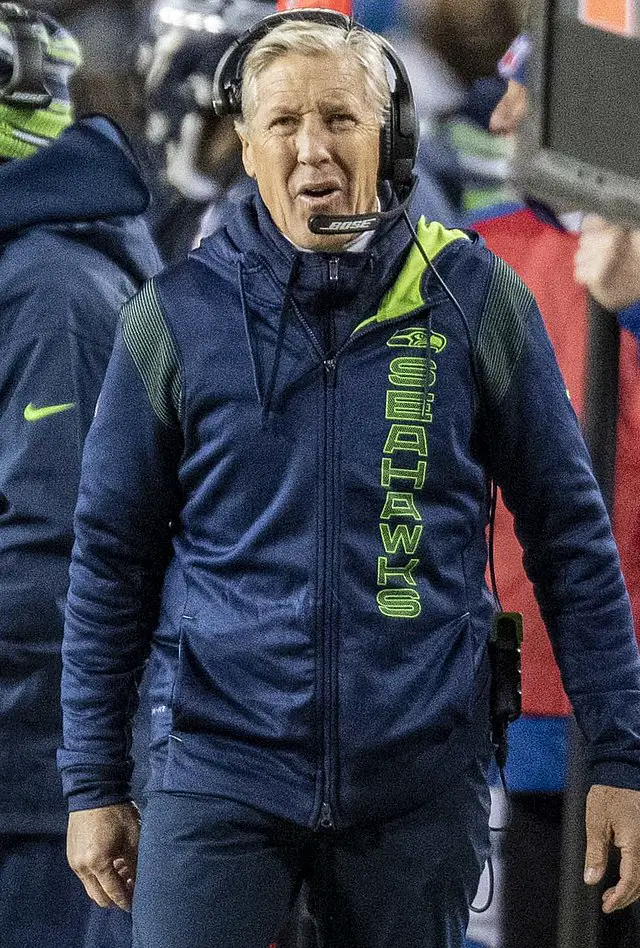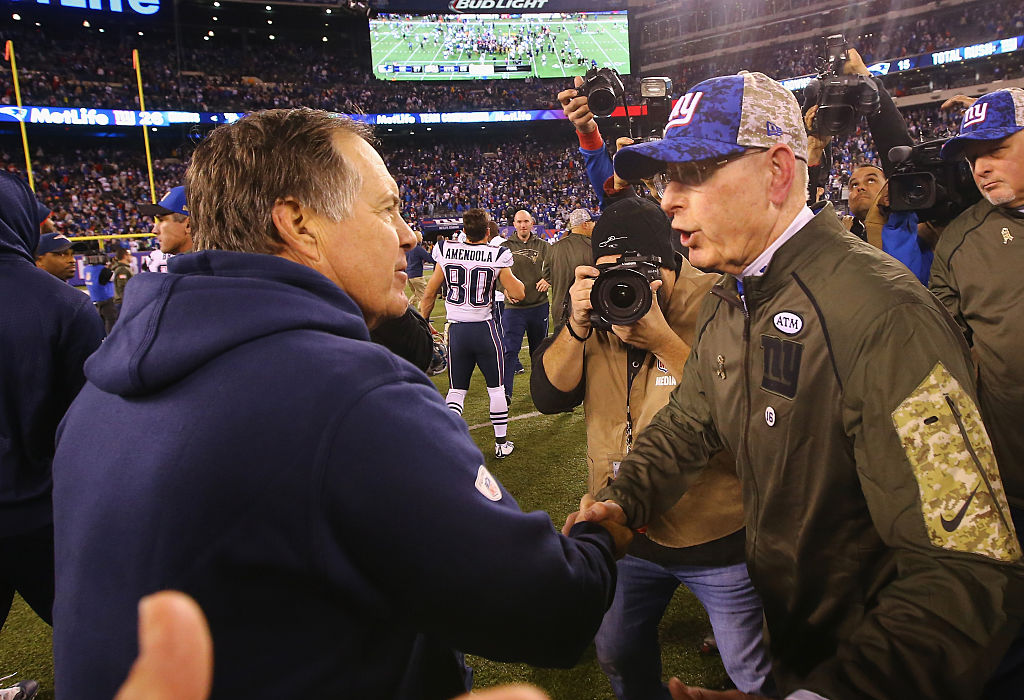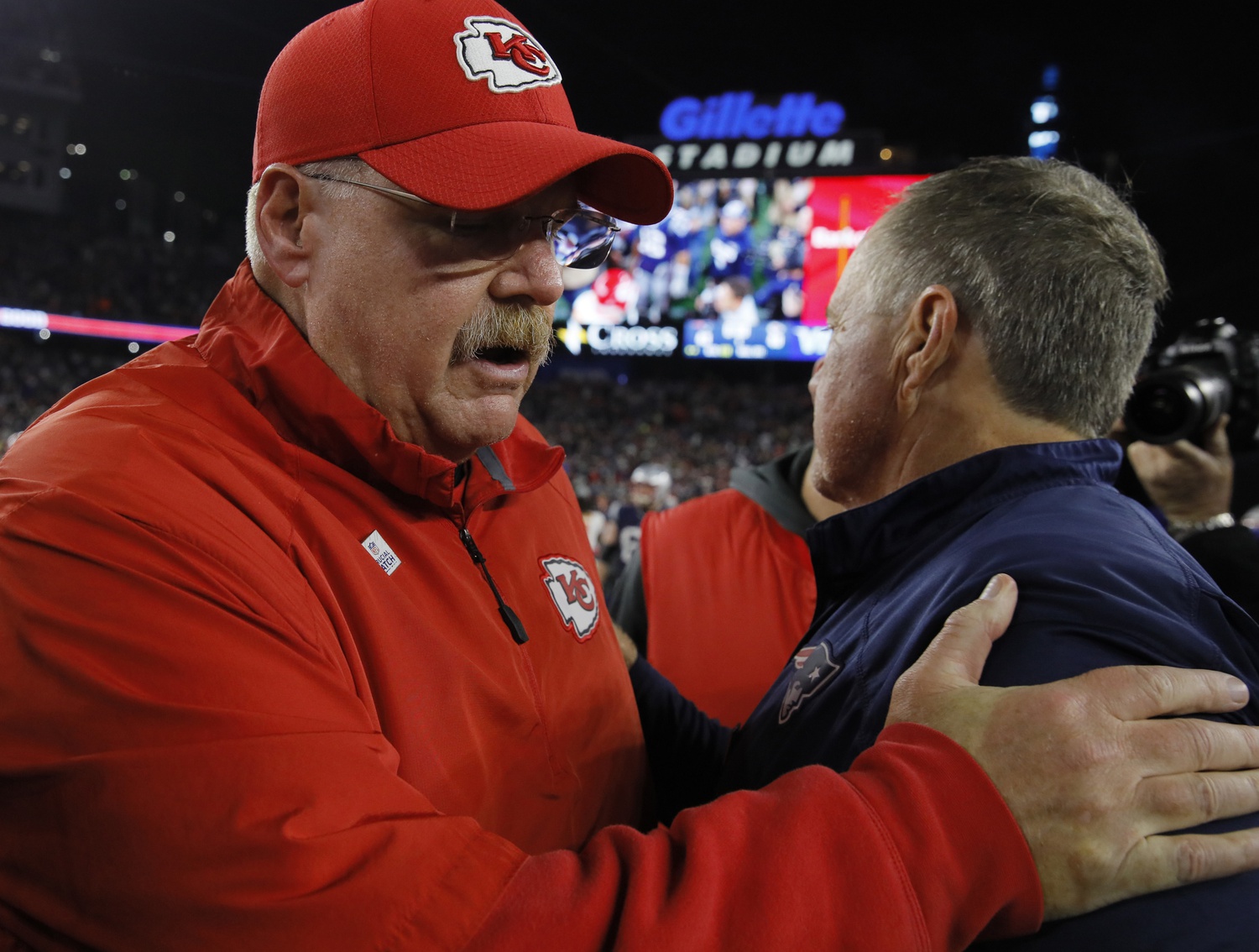Who Is The Oldest Coach In The NFL? Exploring Longevity And Wisdom On The Sidelines
Have you ever stopped to wonder, really, who holds the title for the oldest coach in the NFL? It's a question that, quite frankly, pops up quite a bit among football fans, and it speaks to something pretty fundamental about the game: the enduring power of experience. We often celebrate the young, dynamic play-callers, the fresh faces bringing new ideas to the field, but there's a unique respect, a certain kind of admiration, reserved for those who have seen countless seasons come and go. It’s a bit like looking at an ancient tree, you know, the kind that has stood for hundreds, even thousands of years, weathering every storm; there's just so much history and resilience in its very presence. These coaches, in a way, embody that same kind of long-standing strength and wisdom.
The world, as a matter of fact, seems to be getting older, doesn't it? We see reports, for instance, about how more than one in ten people in Japan are now aged 80 or older, and that country consistently rates as having the world's oldest population. This kind of demographic shift, really, has a profound impact on economies and workforces globally. In the NFL, this general trend of increasing longevity, you might say, plays out in its own unique way, with seasoned coaches continuing to shape the sport. It challenges, perhaps, some of our assumptions about age and capability in high-pressure environments.
So, we're going to take a closer look at what it means to be an older coach in professional football. We'll explore the value that years of experience bring to the sidelines, the challenges these individuals face, and what their continued presence says about the nature of leadership and learning in a sport that never, ever stops evolving. You know, it’s not just about a number; it’s about a legacy, a deep well of knowledge that keeps teams competitive. We’ll also touch on some broader ideas about age and its role in society, drawing a few interesting connections from some other observations about long-lived entities and individuals.
Table of Contents
- The Enduring Presence of Experience in the NFL
- Why Age Might Be a Coaching Advantage
- The Value of Experience: A Look Beyond the Sidelines
- The Challenge of Longevity in a Fast-Paced Game
- Key Traits of Long-Serving Coaches
- Understanding the Role of Age in Team Dynamics
- What Does the Future Hold for Older Coaches?
- Common Questions About NFL Coaching Longevity
The Enduring Presence of Experience in the NFL
The question of "Who is the oldest coach in the NFL?" really gets at the heart of how much we value wisdom that comes with years. It’s not always about the flashiest new strategy; sometimes, you know, it’s about a deep understanding of the game that only decades of observation and participation can provide. Think about it: a coach who has navigated countless seasons, seen different eras of players and rule changes, they possess a kind of institutional memory that is pretty much irreplaceable. This sort of long-term perspective, you see, helps them make decisions under pressure, knowing what has worked and what hasn't in similar situations.
It's interesting, in a way, to compare this to how we view other long-standing entities. For instance, some countries have had continuous democracies for a very long time, like the United States, which has had continuous democracy for over 200 years. That kind of longevity, you know, speaks to a system that has adapted and endured. Similarly, an older NFL coach has adapted to countless changes in offensive and defensive schemes, player personalities, and the overall culture of the league. They've seen it all, more or less, and that deep historical context is incredibly valuable when facing a new challenge.
The very presence of an older coach, you could argue, often brings a sense of calm and stability to a locker room. Players, especially the younger ones, might look to these seasoned figures as mentors, individuals who have truly mastered their craft. It’s not just about X's and O's; it’s about managing people, motivating a diverse group, and instilling a winning mentality. That, in some respects, comes from a lifetime of learning and leading. This is why, you know, the question of who is the oldest coach in the NFL isn't just trivia; it's a recognition of sustained excellence and dedication.
Why Age Might Be a Coaching Advantage
While some companies, apparently, find it hard to prioritize workers aged over 55, the NFL often seems to buck that trend when it comes to coaching. There’s a strong argument to be made that age, in fact, can be a significant advantage on the sidelines. Older coaches typically bring a level of composure and emotional intelligence that younger coaches might still be developing. They’ve experienced the highs and lows, the crushing defeats and the glorious victories, and this broad emotional spectrum allows them to remain steady when things get chaotic, which, you know, happens quite a bit in football.
Consider the strategic depth that comes with years. A coach with decades of experience has, arguably, a vast mental database of plays, counter-plays, and personnel matchups. They can, for instance, recognize patterns in opponents' strategies more quickly, having seen similar approaches many times over the years. This isn't just about raw knowledge; it's about the ability to synthesize information rapidly and make crucial decisions in real-time. It’s a bit like an old map, you know, like the Imago Mundi, the oldest known world map dating back to the 6th century BCE; it offers a unique glimpse into ancient perspectives, and similarly, an older coach offers a unique, historical perspective on the game.
Furthermore, older coaches often have incredibly strong networks within the league. They've worked with countless players, assistant coaches, and front-office personnel, building relationships that can be invaluable for scouting, player development, and even attracting talent. This web of connections, you might say, is built over a lifetime and provides a distinct edge. They also tend to have a clear philosophy, a consistent approach that players can rely on, which, you know, fosters trust and a strong team culture. This stability is pretty much essential for sustained success.
The Value of Experience: A Look Beyond the Sidelines
The impact of an older coach extends well beyond the immediate game plan. Their wisdom, you know, can influence the entire organization, from the general manager down to the newest rookie. They often serve as mentors not just to players, but to their assistant coaches, shaping the next generation of football minds. This passing down of knowledge, you know, is a vital part of any successful institution, ensuring that valuable insights aren't lost when individuals retire. It's similar, in a way, to how ancient trees and woodlands play a clear role worldwide, whether hundreds or thousands of years old, providing a foundation for ecosystems.
In a broader sense, the presence of older individuals in prominent roles, like that of an NFL head coach, challenges societal perceptions about aging. While some reports suggest that by the middle of this century, 22% of North America’s population and just over a quarter (27%) of Europeans will be 65 or older, we also see examples of extreme longevity. The fact that the world’s oldest people are all women, with four of the top ten born in the United States and two in Japan, really highlights that age can bring remarkable resilience and continued capability. An older coach, you know, serves as a living example that experience can absolutely lead to peak performance, even in a physically demanding and mentally draining profession.
These coaches, you see, often have a deep understanding of human nature, honed over years of interacting with diverse personalities. This allows them to connect with players on a more personal level, understanding their motivations and challenges. It’s not just about barking orders; it’s about building relationships, and that, arguably, is a skill that improves with time and empathy. This relational aspect, you know, is pretty much fundamental to team cohesion and overall success, fostering a sense of shared purpose among players and staff.
The Challenge of Longevity in a Fast-Paced Game
Despite the clear advantages, maintaining longevity as an NFL coach, especially as the oldest coach, is anything but easy. The game, you know, is constantly evolving. New strategies emerge, player skill sets change, and the sheer speed of the game seems to increase every year. Older coaches must, therefore, remain incredibly adaptable and open to new ideas, which, you know, can be a challenge for anyone who has done things a certain way for a long time. It requires a constant commitment to learning and staying current with the latest trends.
The physical and mental demands of the job are also immense. The hours are long, the pressure is relentless, and the travel schedule can be brutal. It's a job that, you know, requires incredible stamina and resilience, regardless of age. For an older coach, managing energy levels and maintaining focus through an entire season, through all the ups and downs, is a testament to their dedication and, quite frankly, their passion for the sport. This is where, you see, their deep experience in handling stress and adversity really comes into play.
Furthermore, the competitive nature of the NFL means that job security is always tenuous. One or two losing seasons can quickly lead to a coaching change, regardless of past accomplishments or experience. So, for an older coach to remain at the top, they must consistently deliver results, which, you know, puts immense pressure on them every single week. It's a bit like the constant pressure on governments to provide safety and order, as Thomas Hobbes described in his Leviathan; without that consistent provision, things can quickly unravel, and similarly, without consistent wins, a coach's position becomes very precarious.
Key Traits of Long-Serving Coaches
What makes a coach capable of enduring for so long in the NFL? There are, you know, a few common threads that tie together the most successful and long-serving individuals. First and foremost is an incredible passion for football. This isn't just a job for them; it's a way of life, a deep-seated love for the game that fuels their relentless work ethic. That, you know, is pretty much the foundation of their sustained drive. They are, quite frankly, obsessed with the details and always looking for an edge.
Another crucial trait is adaptability. The NFL is not static; it's a league of constant innovation. The oldest coaches, you know, are those who have shown a willingness to evolve their schemes, embrace new technologies, and adjust to changing player demographics. They understand that clinging to outdated methods will quickly lead to failure. This flexibility, you see, allows them to remain relevant and competitive, which, you know, is absolutely vital for staying in the game for decades.
Finally, strong leadership and communication skills are paramount. These coaches are masters of motivating diverse groups of individuals, from young rookies to seasoned veterans. They know how to deliver tough messages, inspire confidence, and foster a cohesive team environment. This ability to connect with people, you know, and build a winning culture, is often refined over many years, making them incredibly effective leaders. It’s a bit like the nuanced definition of the world’s oldest democracy; depending on how you define things, there are many jurisdictions that can lay claim to this coveted title, and similarly, there are many ways to define effective coaching, but leadership is always at its core.
Understanding the Role of Age in Team Dynamics
The age of a coach can, you know, subtly influence the dynamic within a team. An older coach might command a different kind of respect, perhaps a more paternal or grandfatherly figure, compared to a younger coach who might be seen more as a peer. This can be a double-edged sword, of course. On one hand, it can foster deep trust and reverence; players might feel more comfortable seeking advice or guidance from someone with such vast life and football experience. On the other hand, you know, there might be a perception among some that an older coach is less in tune with modern player culture or trends.
However, the difference, you know, is often small. What truly matters is the coach's ability to connect and communicate effectively, regardless of their age. A great coach, whether young or old, finds ways to relate to their players, understand their perspectives, and motivate them to perform at their best. It's not about the number of years they've lived; it's about the quality of their leadership and their ability to inspire. This is where, you see, the relationships we have with people, whether in sports or daily life, truly make a difference.
The presence of an older coach can also, arguably, provide a valuable counterpoint to the youthful energy of the players. They bring a calming presence, a voice of reason that has seen it all before. This balance, you know, between youthful exuberance and seasoned wisdom, can create a very potent mix on a football team. It allows for both innovation and stability, which, you know, is a pretty powerful combination for any organization striving for excellence. They often embody the very essence of sustained performance.
What Does the Future Hold for Older Coaches?
Given the increasing longevity of populations worldwide, and the fact that the number of people aged 65 and older is expected to double over the next three decades, reaching 1.6 billion in 2050, it seems pretty clear that we will continue to see older individuals thriving in various professions, including, you know, NFL coaching. Asia is leading this trend, but it's a global phenomenon. As medical advancements continue and perceptions of age evolve, the idea of an "old" coach might, in fact, shift considerably. What was once considered old might, you know, simply become "experienced."
The NFL, like many other high-stakes industries, will likely continue to value the unique blend of experience, strategic acumen, and leadership that long-serving coaches provide. While the search for the next young prodigy will always be there, the proven track record of older coaches will, you know, remain a powerful draw. It's about finding the right fit for a team, and sometimes that fit is someone who has, quite frankly, seen every possible scenario play out on the field. This blend of new ideas and seasoned judgment is, you know, often the recipe for success.
Ultimately, the future of older coaches in the NFL will depend on their continued ability to adapt, innovate, and connect with players. As long as they remain effective leaders and strategists, their age will likely be seen as an asset rather than a hindrance. The league, you see, is a meritocracy, and performance will always be the ultimate arbiter. So, you know, as long as they keep winning, their age will be just another fascinating detail in their storied careers. Learn more about coaching philosophies on our site, and find more insights on team management.
Common Questions About NFL Coaching Longevity
How old is the average NFL head coach?
While the exact average fluctuates each season, NFL head coaches tend to be in their late 40s to early 60s. However, you know, there's a wide range, with some younger coaches making their mark and others, like those we've been discussing, continuing well into their later years. The average, you see, is pulled up by those incredibly long-serving individuals.
Do older coaches have a better success rate in the NFL?
It's not a simple yes or no answer, really. Success in the NFL depends on so many factors: talent on the roster, front office support, a bit of luck, and, you know, the coach's scheme. However, older coaches often have a higher win percentage simply because they've had more time to accumulate wins and have typically survived in the league due to past successes. Their experience, you know, certainly gives them a strategic edge in many situations.
What are the physical demands on older NFL coaches?
The physical demands are considerable, quite frankly. Coaches spend long hours on their feet, often travel extensively, and deal with immense stress. They need to maintain good health and stamina to keep up with the grueling schedule of an NFL season. It's a job that, you know, requires both mental and physical toughness, regardless of age. They are, in a way, like athletes themselves, needing to be in top form.

Who are the oldest NFL head coaches? - Coaching Rumors

Oldest Nfl Head Coach 2025 - Sarah Davis

Oldest Nfl Head Coach 2025 - Sarah Davis